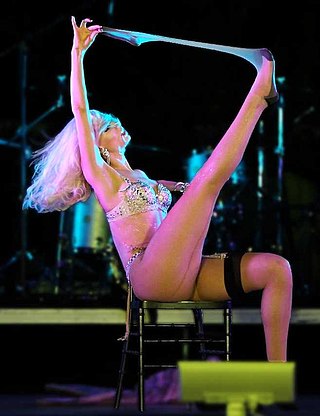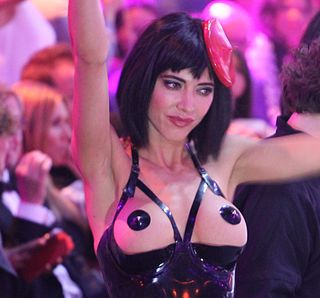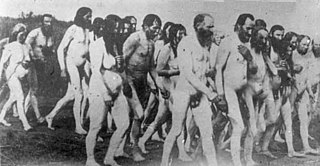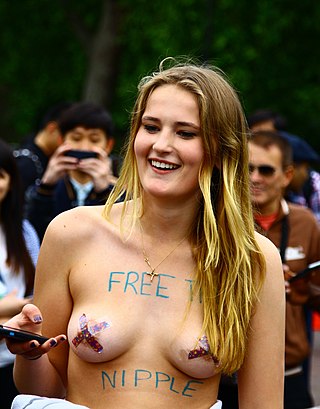
Halle Maria Berry is an American actress. She began her career as a model and entered several beauty contests, finishing as the first runner-up in the Miss USA pageant and coming in sixth in the Miss World 1986. Her breakthrough film role was in the romantic comedy Boomerang (1992), alongside Eddie Murphy, which led to roles in The Flintstones (1994) and Bulworth (1998) as well as the television film Introducing Dorothy Dandridge (1999), for which she won a Primetime Emmy Award and a Golden Globe Award.

A striptease is an erotic or exotic dance in which the performer gradually undresses, either partly or completely, in a seductive and sexually suggestive manner. The person who performs a striptease is commonly known as a "stripper" or an "exotic dancer".

Indecent exposure is the deliberate public exposure by a person of a portion of their body in a manner contrary to local standards of appropriate behavior. Laws and social attitudes regarding indecent exposure vary significantly in different countries. It ranges from outright prohibition of the exposure of any body parts other than the hands or face to prohibition of exposure of certain body parts, such as the genital area, buttocks or breasts.
An intimate part, personal part or private part is a place on the human body which is customarily kept covered by clothing in public venues and conventional settings, as a matter of fashion and cultural norms. In several cultures, revealing these parts is seen as a religious offence.

A stripper or exotic dancer is a person whose occupation involves performing striptease in a public adult entertainment venue such as a strip club. At times, a stripper may be hired to perform at a bachelor party or other private event.

A bodystocking or body stocking is a one-piece skin-tight garment that covers the torso, legs and sometimes the arms of the wearer. It is a foundation garment or an article of lingerie usually made from a sheer fabric similar to that used for stockings or pantyhose, or from fishnet, lace or an opaque material, or a variation of these materials. A bodystocking differs from a unitard, which is worn as an outfit or article of clothing, and a leotard, which is used as a practice garment or performance costume for acrobats, gymnasts and other similar performers. Designed to be revealed, but not to be too revealing, bodystockings may be worn as undergarments by performers such as belly dancers and exotic dancers.

A merkin is a pubic wig. Merkins were worn by sex workers after shaving their mons pubis, and are now used as decorative items or erotic devices by both men and women.
In filmmaking, a double is a person who substitutes for another actor such that the person's face is not shown. There are various terms associated with a double based on the specific body part or ability they serve as a double for, such as stunt double, "dance double", "butt double" and "hand double".
A sexual inhibition is a conscious or subconscious constraint or curtailment by a person of behavior relating to specific sexual matters or practices, a discussion of sexual matters or viewing certain sexual material. To some extent such inhibitions may arise from cultural and social influences and conditioning, as well as from personal factors, including sexual orientation. In most partner relationships, the level of inhibition tends to decrease the higher the level of trust that develops between the partners. Such inhibitions also tend to decrease with improvements in a person's confidence in their sexuality. A person may take a drug, such as alcohol, to reduce their level of inhibition.

Swordfish is a 2001 American action thriller film directed by Dominic Sena, written by Skip Woods, produced by Joel Silver, and starring John Travolta, Hugh Jackman, Halle Berry, Don Cheadle, Vinnie Jones, and Sam Shepard. The film centers on Stanley Jobson, an ex-con and computer hacker who is targeted for recruitment into a bank robbery conspiracy because of his formidable hacking skills.

Toplessness refers to the state in which a woman's breasts, including her areolas and nipples, are exposed, especially in a public place or in a visual medium. The male equivalent is barechestedness, also commonly called shirtlessness.

Pasties are patches that cover a person's nipples and areolae, typically self-adhesive or affixed with adhesive. They originated as part of burlesque shows, providing a commercial form of bare-breasted entertainment. They are also worn as an undergarment in lieu of a bra, or visibly as a fashion accessory, and are sometimes called nipple stickers. Pasties are also, at times, used while sunbathing, worn by strippers and showgirls, or as a form of protest during women's rights events such as Go Topless Day. In some cases this is to avoid potential prosecution under indecency laws.

Cerina Vincent is an American actress. She had her breakthrough role starring as Maya in the television series Power Rangers Lost Galaxy, followed by a part in the comedy film Not Another Teen Movie, before going on to star in the horror film Cabin Fever, which established her as a "scream queen" and led to further roles in horror movies. More recently, she appeared as Suzy Diaz in the Disney Channel series Stuck in the Middle. She has also written three books with Jodi Lipper, wrote a regular column for The Huffington Post, and co-hosts the podcast Raising Amazing with Dr. Joel Gator.

In film, nudity may be either graphic or suggestive, such as when a person appears to be naked but is covered by a sheet. Since the birth of film, depictions of any form of sexuality have been controversial, and in the case of most nude scenes, had to be justified as part of the story.

A handbra is the practice of covering female nipples and areolae with hands or arms. It often is done in compliance with censors' guidelines, public authorities and community standards when female breasts are required to be covered in film or other media. If the arms are used instead of the hands the expression is arm bra. The use of long hair for this purpose is called a hair bra.

Nudity is sometimes used as a tactic during a protest to attract media and public attention to a cause, and sometimes promotion of public nudity is itself the objective of a nude protest. The use of the tactic goes back to well published photos of nude protests by svobodniki in Canada in 1903. The tactic has been used by other groups later in the century, especially after the 1960s. Like public nudity in general, the cultural and legal acceptance of nudity as a tactic in protest also varies around the world. Some opponents of any public nudity claim that it is indecent, especially when it can be viewed by children; while others argue that it is a legitimate form of expression covered by the right to free speech.

Sex in film, the presentation of aspects of sexuality in film, specially human sexuality, has been controversial since the development of the medium. Films which display or suggest sexual behavior have been criticized by religious groups or have been banned or censored by governments, although attitudes have changed much along the years and a more permissive social environment has developed in certain parts of the world, notably in Europe, North America, Australia and New Zealand. In countries with a film rating system, films which contain explicit sex scenes typically receive a restricted classification. Nudity in film may be regarded as sexual or as non-sexual.

Free the Nipple is a topfreedom campaign created in 2012 during pre-production of a 2014 film of the same name. The campaign highlights the general convention of allowing men to appear topless in public while considering it sexual or indecent for women to do the same, and asserts that this difference is an unjust treatment of women. The campaign argues that it should be legally and culturally acceptable for women to bare their nipples in public.

Siphayo is a 2016 Philippine erotic thriller independent film directed by Joel Lamangan, and starring Luis Alandy, Joem Bascon, and Nathalie Hart.

In the United States, states have primary jurisdiction in matters of public morality. The topfreedom movement has claimed success in a few instances in persuading some state and federal courts to overturn some state laws on the basis of sex discrimination or equal protection, arguing that a woman should be free to expose her chest in any context in which a man can expose his. Other successful cases have been on the basis of freedom of expression in protest, or simply that exposure of breasts is not indecent.
















